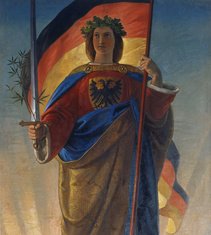|
Question or Term
|
Answer
|
|
The period from 1815 to the outbreak of the March 1848 revolutions in Berlin and Vienna, characterised by reactionary politics and repression
|
Vormärz
|
|
That Grand Duchy which experienced significant unrest in February 1848, with peasants attacking aristocratic property, and citizens forming an assembly demanding liberal reforms (largely granted) and a bill of rights, sparking a chain reaction of similar events in other German states
|
Baden
|
|
That body which was often feckless in achieving anything as it required the unanimous approval of its members for decisions to be passed from 1822 onwards
|
Federal Convention
|
|
A leading Austrian diplomat, Foreign Minister from 1809 until 1848 and Minister President from 1821 until 1848, known for his abject conservatism, and the political system he led the way in formulating in Europe after the Napoleonic Wars
|
Prince Klemens von Metternich (1773 - 1859)
|
|
Identification with one's nation which is held central to all political activity and decision making
|
Nationalism
|
|
The electoral issue that divided the Prussian right-wing liberals and left-wing liberals due to debate over whether or not widening it would invite revolution
|
Franchise
|
|
That which was denied to most of the Austrian population under the newly drafted constitution of April 1848, causing protesters to reject it
|
Franchise
|
|
The Prussian Finance Minister from 1825 to 1830 who extended the Prussian Customs Union and encouraged road building to circumvent the two competing German customs unions in order to facilitate political union under Prussian leadership
|
Friedrich von Motz (1775 - 1830)
|
|
A name given to the Frankfurt Parliament due to its high proportion of teachers, professors, lawyers, and those with degrees
|
Professor's Parliament
|
|
That body, convened in May 1850 by Prince Felix of Schwarzenberg to challenge the legitimacy of the Erfurt Parliament
|
Federal Convention
|
|
|
Question or Term
|
Answer
|
|
A constitution proclaimed by King Frederick William IV in December 1848 after dissolving the Prussian National Assembly that appeased many liberal demands, established a bicameral legislature, but preserved the powers of the king to appoint and dismiss ministers and alter the constitution unilaterally
|
Constitution of Prussia
|
|
An Austrian agreement with the Catholic Church which gave the latter much greater state influence, alienating Protestants and secularists alike
|
1855 Concordat
|
|
An uprising of republicans and democrats in Baden in April 1848 which was crushed with the support of Bavarian and Prussian troops
|
Hecker Uprising
|
|
A constitution for a German Empire narrowly agreed by the Frankfurt Parliament in March 1849, espousing the kleindeutschland solution, and a bicameral legislature, all headed by a powerful emperor
|
Paulskirche Constitution
|
|
A series of food riots in Berlin in 1847
|
Potato Revolution
|
|
That crisis which was 'solved' after Otto von Bismarck was appointed Minister President of Prussia in 1862 and - after failing spectacularly to ameliorate relations with Parliament - declared Parliament's support for von Roon's Army Reform Bill unnecessary, enforcing it against their will
|
1860 - 62 Constitutional Crisis
|
|
That which could best describe the situation from 1846 to 1847 caused by disastrous corn harvests and severe potato blight - part of the wider hungry forties
|
Economic Crisis
|
|
A series of 1648 treaties that ended the Thirty Years War and gave the Holy Roman Empire's constituent states much greater independence from the Habsburg emperors
|
Peace of Westphalia
|
|
A declaration by 51 representatives from Prussia, Bavaria, Württemberg, Baden, Nassau, and Frankfurt, published in March 1848 calling for the creation of a German-wide meeting to discuss proposals for political reform
|
Declaration of Heidelberg
|
|
The king of Prussia who rejected the position of Emperor offered to him by the Frankfurt Parliament in March 1849
|
Frederick William IV (1795 - 1861)
|
|

